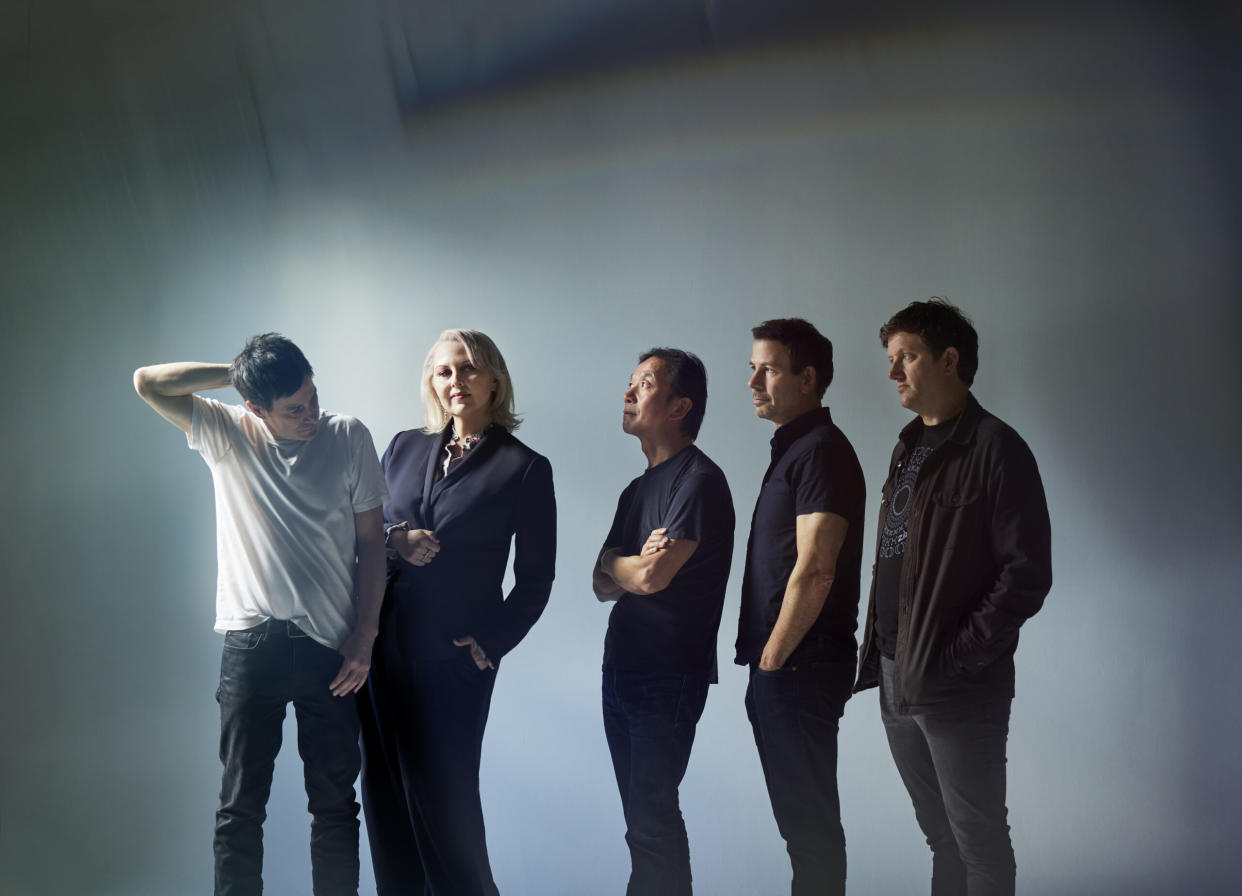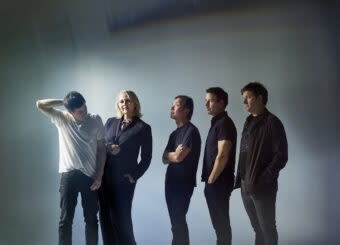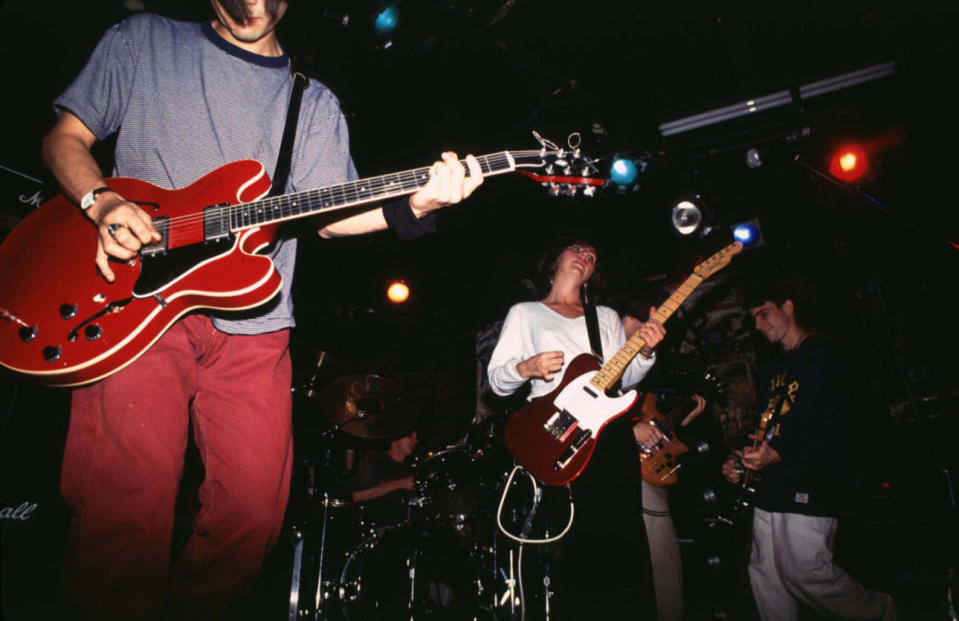Drop Nineteens Are Back in the Driver’s Seat

- Oops!Something went wrong.Please try again later.
- Oops!Something went wrong.Please try again later.

More from Spin:
Chaos Theory: How Justice Shattered Their Six-Year Silence in Style
Brittany Davis on New Album Image Issues and Navigating a Visual World
It’s two hours before doors open, and Ira Bornstein is already lined up outside The Atlantis in Washington, D.C. The grinning 24-year-old is clutching a Drop Nineteens skateboard and a tote bag containing four CDs—including two copies of Drop Nineteens’ 1992 shoegaze masterwork, Delaware—three vinyl records, and a rare promotional VHS for the band’s “Winona” single. Hoping to snag the group’s attention to get his collection autographed, Bornstein is patiently waiting with his 21-year-old friend Marcelo, who discovered Drop Nineteens—who haven’t played live in 30 years—on TikTok.
“Am I listening to a song or a short story?” Marcelo thought when he first heard Drop Nineteens’ now-canonical shoegaze epic “Kick the Tragedy,” one of the first (and best) American reactions to the sound that My Bloody Valentine and Slowdive were crafting abroad in the early ‘90s. Marcelo knew he “had to” see Drop Nineteens live when this show was announced, especially since it marked the Boston icons’ first since 1994. By the time people begin filtering into the venue, nearly every person in line appears to have been born some time after their breakup.
“Oh, my god,” gasps Paula Kelley, one of the band’s two singers and three guitarists, when she learns how young the demographic skews on the other side of the green room. Kelley and her bandmates—singer-guitarist Greg Ackell, bassist Steve Zimmerman, guitarist Moto Yasue, and drummer Pete Koeplin—are huddled backstage an hour before showtime, shiftily munching on snacks as they make their final preparations for the big moment. Ackell hasn’t stepped foot on stage since 1994, and after the seven shows they have on the docket for the rest of April, there’s a chance he might never again.
“This band knows how to go away,” he warns. “So if that’s what we do, that’s what we do.”

The first incarnation of Drop Nineteens lasted less than five years. They formed as college friends in 1990, their 1991 demo made waves in the U.K. press, and they unveiled the eclectic, noisy, cryptically alluring shoegaze monument, Delaware, in 1992. By 1995, every founding member besides Ackell had left, and their decidedly un-shoegaze sophomore LP, 1993’s National Coma, was a flop. Ackell put the band to bed, quit music, and swore to leave Drop Nineteens behind for good.
However, in 2022, the band’s primary songwriter suddenly felt an inexplicable urge to make a third Drop Nineteens album, so Ackell re-assembled most of the original lineup (Koeplin’s from the National Coma era) and they wrote the unexpected Hard Light, released in November 2023 and roundly celebrated as a successful return to shoegaze form. Even with the reunion album in motion, playing live again “was never part of the calculus,” Ackell underscores.
“If it was originally going to be part of the agreement, I don’t think I would’ve done it,” Kelley adds, laughing nervously. She had a prolific musical career after leaving Drop Nineteens but hasn’t performed live in nine years. That dry spell was initially set to be broken last October, but after Hard Light’s release date got pushed back, the band decided to reschedule the shows for spring 2024, further drawing out anticipation for an event that longtime Drop Nineteens fans never expected to happen in the first place.
In the decades since their dissolution, Drop Nineteens’ music—particularly Delaware and their early demos—amassed a devoted cult fanbase that rightfully considers them one of the greatest shoegaze bands of all time. Like Duster and American Football, Drop Nineteens are another short-lived ‘90s band whose posthumous legacy ballooned in the internet era, first through file-sharing and now on TikTok. Beyond their music, Delaware’s striking album cover—a photo of a young girl wielding a handgun in broad daylight—has taken on a life of its own online, where it carries a certain type of early-’90s edge that’s uneasily enticing to behold even outside of its musical context.
“I think there’s some people that know that cover and don’t even know Drop Nineteens,” Ackell testifies.

Therefore, many fans are naturally a bit peeved that the band have decided to change it for the impending vinyl reissue. The newly edited version replaces the gun in the girl’s hand with a flower, which the band have repeatedly attributed to the connotations the gun-toting iteration now carries amid America’s mass shooting epidemic. When pressed, they reveal that there was more to the decision. Their friend Phil—who Kelley refers to as, “fucking Phil” in “Kick the Tragedy,” and who facilitated Koeplin joining the band—passed away some time ago.
“He was a good friend of ours, and a gun was involved,” Ackell says, stuttering over his words. The others nod their heads in agreement when the frontman explains that Kelley’s line, “fucking Phil, he’s off on his board somewhere,” has taken on a new meaning. “We like to think of him as off on his board somewhere,” Ackell says plaintively. He adds that it “annoys the fuck out of me” that they aren’t able to edit the cover on streaming services yet due to contract clauses, but he confirms that they’ll be able to make that switch in a few years’ time.
Despite the band’s emotional reasoning, fans have been vocally divided on the Delaware cover edit since it was first teased last fall. Completionist superfan Bornstein, for instance, “fully supports” Drop Nineteens’ decision to change the art but says he didn’t pre-order the new vinyl because the original cover holds so much nostalgic value to him.
“I don’t feel like we’re correcting a problem,” Ackell says of the new art. “I feel like we’re doing what we want to do now, which are two separate things.”
Through reigniting the long-defunct band, whose name now carries more esteem than it ever did when they were first active, Drop Nineteens are experiencing a fascinating tension between the interests of their fans, their labels, and themselves—as people who are 32 years older than they were when Delaware came out. The band attained classic status without their hands on the wheel, and now that they’re back in the driver’s seat, the members are realizing what elements of Drop Nineteens they have control over, and what remains, frustratingly, beyond their grasp.
Despite a whole rigamarole of sign-offs for their band-sanctioned Delaware re-press, the U.K. vinyl company Music on Vinyl was able to reissue the LP—with its original cover art, no less—in early 2024 without the band’s approval. “It makes no sense,” Ackell sighs. There are other vinyl woes: The crown jewel of their merch booth tonight is the first-ever vinyl variant of the band’s 1991 demos, which have never been officially released either physically or digitally. As of now, the 1991 vinyl is only available at this run of shows, a stipulation that Ackell grumbles about when it comes up, claiming it was their label’s strategy, not the band’s idea to “withhold” the songs from hungry fans.
“In order to get [1991] available for people, we had to agree to that,” he says with a resigned tone. He promises that the songs will be on streaming services eventually.
Drop Nineteens aren’t back in action to be a business. These days, many vinyl variants with the exclusive allure of the 1991 LP are being priced north of $50, but Drop Nineteens are selling their records and T-shirts—including signed copies of Hard Light—at their merch booth for just $25. “It has only cost this band money to come back and be in this room with you tonight,” Ackell stresses. This isn’t a cash grab. They just want to give their fans—and themselves—what they’ve been deprived of for three decades.
“When we first got in the rehearsal room and [played] those opening chords of ‘Delaware,’ I felt something,” Kelley says, smiling. “It brings an energy that I can’t get any other way. It feels really good.”
The crowd tonight got to feel that, too. The band takes the stage nearly 45 minutes after opener Greg Mendez finished his set, but the palpable anticipation is drawn out to a near-comical degree when, just as opener “Delaware” is swelling to its first explosion, Yasue’s guitar cuts out. The band, who haven’t had to pull off an instrumental filibuster since the Clinton years, exchange nervous glances while the guitar techs scramble to diagnose the issue. Eventually, the stoic Yasue gives the nod, the band seamlessly rip into that main motif, and there isn’t a single neck that’s not rawking in approval.
“That was a dramatic beginning, Moto,” Ackell quips when the song resolves. They’re back in control—and sound glorious for the rest of the set. The slightly softer, lusher Hard Light songs mesh well with the rawer Delaware rippers, and newly drafted live member Aaron Tap fans out their sound by adding a fourth guitar to their six-string tapestry. The tightly packed audience groove along contently and clap profusely, but most fans appear too transfixed to even step away for another beer. A couple twentysomethings with their arms over each other’s shoulders giddily jump up and down at one point, and a mini-moshpit forms during another. There’s no heckling to be heard.
After awkwardly ambling offstage for a charmingly canned encore, the smoke machines switch to full-blast and the stage lights intensify to a blinding glare. Everyone knows what’s coming, but when the swirling riff of “Kick the Tragedy” begins—marking only the second time they’ve ever played what’s now their definitive song—a fan bellows, “Yes! YES!” as if Jesus has just re-emerged in front of us. Drop Nineteens made a point to (almost) never play the nine-minute, mostly instrumental song back in the ’90s, but they’re fully aware how much it means to fans now, and they were excited backstage to reveal how hard they practiced for this moment.
Seeing them play “Kick the Tragedy,” feeling the crowd’s intense satisfaction to be experiencing it after all these years, is indescribably special. And It evokes something the group expressed before the show: the idea that this reunion is not about taking control, per se. It’s about contributing to the entity that is Drop Nineteens, something that now belongs to the fans as much as it does the band.
“These shows mean we have a say in it,” Ackell says of their legacy. Then he gets more existential. “Ultimately, it’s all out of your hands. It’s a brief hold you have on it.”
“As with anything,” Kelley interjects. “The more you live, the more you realize anything could happen. Nothing could happen.”
At this moment, the lyrics of “Kick the Tragedy” feel apt. For these live shows, Kelley re-recorded her iconic monologue and subtly tweaked the final line to include the band’s name in place of the age she was when she first wrote it, 19. “I’m just in Drop Nineteens, how serious can anything be anyway?” the new version reads, her soft voice murmuring through the fog and flashing lights of the packed Atlantis.
“Not very,” she then answers with a satisfying inconclusiveness, queuing each member to leave the stage, one by one, with smiles on their faces, visibly thrilled to have a say in it once again.
To see our running list of the top 100 greatest rock stars of all time, click here.

